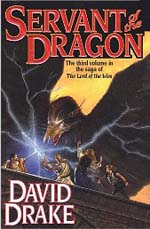
Cover art: Donato
The (common) religion of the Isles is based on Sumerian cult and ritual, but the magic itself comes from the Mediterranean and is mostly Egyptian in its original source. The voces mysticae which I’ve referred to as “words of power” in the text represent the language of demiurges; that is, they are intended to have meaning to beings which can then translate human desires to the ultimate powers of the cosmos. I have copied them from real spell manuscripts of the classical period.
I don’t personally believe that the voces mysticae have power over events, but millions of intelligent, civilized people did believe that. I don’t pronounce the voces mysticae aloud when I’m writing.
Rather than invent literary sources for the background of Servant of the Dragon, I’ve used real ones. The actual quotes are from poems by Horace and Ovid; my translations are serviceable, but Horace in particular deserves better than anyone can give him in English.
In addition there are passing references to Homer, Vergil, Hesiod, Athenaeus, and Plato. The fascinating thing about going to original sources is that it’s the best way to learn not only what people distant in time thought but also how they went about thinking.
And you know, when you’ve seen the differences between us and the ancestors of our Western culture, it may make you–as it certainly has made me–a little more tolerant of the beliefs of different modern cultures. That wouldn’t be a bad thing for the world.
–Dave Drake